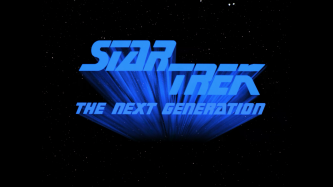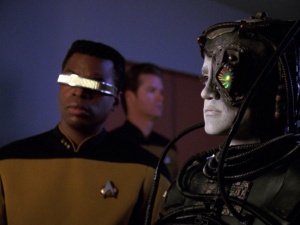“Let me tell you something, when this “kid’s” big brothers come looking for him, they’re not gonna stop until they find him. And they’ll come looking for us, and they will destroy us. And they will not do any of the soul-searching that you’re doing now.”

 “I BORG”
“I BORG”
Star Trek: The Next Generation
Written by René Echevarria
Directed by Robert Lederman
Original Air Date May 11, 1992
One of the things that Star Trek did better than almost any other science fiction television show is it took moral quandaries and explored them from every angle — or at least as many angles as was possible in a 45-minute episode without losing the sense of action and tension and grinding the episode to a talky, preachy bore (okay, it did occasionally commit that crime). It was also great at exploring the value of life and what it meant to be human. The Next Generation did this better than any of the other Trek shows. And “I Borg” is one of the finest examples.
 The Enterprise discovers Borg wreckage with one survivor, nearly dead. Knowing that another Borg ship will soon come to collect the bodies, the obvious course of action, at least to Captain Picard, is to leave the survivor, who will be dead by the time his fellows arrive. Worf recommends “killing it now.” But of course, Dr. Crusher sees things differently. To her, he is a patient under her care and cannot be left behind. Picard eventually agrees to bring it on board under heavy security measures, but only to use him for military purposes: infect the Borg with an invasive program that, when the Borg is returned to the collective, will be transmitted throughout the collective’s hive mind, destroying them. You can imagine that this doesn’t make Beverly very happy. A discussion in the conference room explores issues of individuality, rights and obligations in wartime, the nature of war against a collective. In this case even Counselor Troi is in agreement against Crusher, a very rare occurrence. Beverly stands as the sole voice
The Enterprise discovers Borg wreckage with one survivor, nearly dead. Knowing that another Borg ship will soon come to collect the bodies, the obvious course of action, at least to Captain Picard, is to leave the survivor, who will be dead by the time his fellows arrive. Worf recommends “killing it now.” But of course, Dr. Crusher sees things differently. To her, he is a patient under her care and cannot be left behind. Picard eventually agrees to bring it on board under heavy security measures, but only to use him for military purposes: infect the Borg with an invasive program that, when the Borg is returned to the collective, will be transmitted throughout the collective’s hive mind, destroying them. You can imagine that this doesn’t make Beverly very happy. A discussion in the conference room explores issues of individuality, rights and obligations in wartime, the nature of war against a collective. In this case even Counselor Troi is in agreement against Crusher, a very rare occurrence. Beverly stands as the sole voice  of humanitarianism: “When I look at my patient, I don’t see a collective consciousness, I don’t see a hive. I see a living, breathing boy who has been hurt and who needs our help.”
of humanitarianism: “When I look at my patient, I don’t see a collective consciousness, I don’t see a hive. I see a living, breathing boy who has been hurt and who needs our help.”
A lot of this hearkens back to the season two episode “The Measure of a Man”, in which Data is submitted to a hearing to determine his personhood — is he a person in his own right or is he an object and the property of Starfleet? In that hearing, Picard is Data’s defense attorney and passionately argues for Data’s rights to be considered an individual with all the protections that includes. He calls out Cdr. Bruce Maddox for referring to Data as “it” rather than “he.” By the end of the episode Maddox has obviously been swayed in his thinking and says “Remarkable, isn’t he?” Capt. Phillipa Louvois, overseeing the hearing, teases him by saying, “You didn’t call him ‘it’!” Its very telling in “I Borg” that Picard not only refers to his  Borg captive as “it,” he refuses to entertain even the notion of the Borg as a person or anything other than a danger to be destroyed. Picard protects himself from losing strategic objectivity by trivializing and objectifying the Borg. In fact, Guinan tries to tell him that if he’s going to use this person to destroy the Borg he should look him in the eye at least once; Picard interrupts her and angrily yells “He’s not a person, damn it, he’s a Borg!” But removed from his connection to the collective, the Borg does indeed begin to display individuality.
Borg captive as “it,” he refuses to entertain even the notion of the Borg as a person or anything other than a danger to be destroyed. Picard protects himself from losing strategic objectivity by trivializing and objectifying the Borg. In fact, Guinan tries to tell him that if he’s going to use this person to destroy the Borg he should look him in the eye at least once; Picard interrupts her and angrily yells “He’s not a person, damn it, he’s a Borg!” But removed from his connection to the collective, the Borg does indeed begin to display individuality.
Picard acquiesces to Guinan’s and confronts the Borg, now nicknamed Hugh by Geordi LaForge, alone in his ready room. Hugh immediately recognizes him and addresses him as Locutus. Picard assumes the role and cross-examines Hugh, and is astounded to learn that even in the presence of a Borg figure to whom he shows deference, Hugh defends Geordi and the crew’s right to live, and refers to himself as “I” rather than a more general “we.” While everyone on the ship knows the Borg from previous encounters, it is Picard and Guinan who have been most directly and personally affected by them: Picard in his capture and violation, and Guinan when her home planet was destroyed  and her race nearly wiped out. Guinan begins the episode being a strong voice against even bringing the Borg on board the ship; when she later confronts Hugh and is herself swayed to his side, it’s a powerful pivot in the narrative. Thanks to Guinan, Hugh learns that no, in fact, resistance is not futile, which he repeats in challenge to Locutus.
and her race nearly wiped out. Guinan begins the episode being a strong voice against even bringing the Borg on board the ship; when she later confronts Hugh and is herself swayed to his side, it’s a powerful pivot in the narrative. Thanks to Guinan, Hugh learns that no, in fact, resistance is not futile, which he repeats in challenge to Locutus.
The great thing about Picard is that he is willing to be wrong. In the face of new evidence, he’s not afraid to revise his stance on an issue. They decide to give the decision of Hugh’s fate to Hugh himself, to let him choose whether he stays on the Enterprise or returns to the Borg collective. At first he doesn’t understand the concept. He wants to stay with Geordi, his friend, but in the end he decides to return to the collective, because staying would mean the Borg would hunt down the ship and assimilate the crew. If there was any question left about Hugh’s status as a sentient being and an individual, he answered them by committing the ultimate human act: sacrificing oneself to save someone else.
Fun Fact:
- The actor who played Hugh, Jonathan del Arco, grew up a fan of the Original Series and had auditioned for the role of Wesley Crusher. He was so disappointed when he didn’t win the role, he refused to watch TNG when it aired. He lifted his self-imposed ban after gaining the role of Hugh.
If you enjoyed this review and would like to read more, please order a copy of my book Doctor Who’s Greatest Hits: An Unauthorized Guide to the Best Stories From Time and Space!